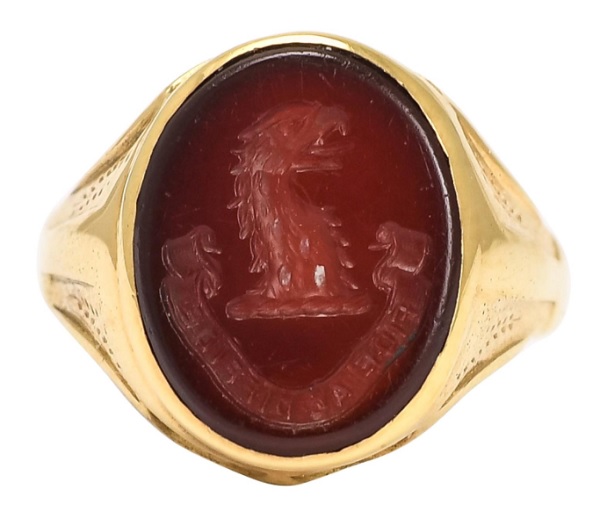FWP:
SETS == A,B
For background see S. R. Faruqi's choices. This verse is NOT one of his choices; I thought it was interesting and have added it myself. For more on Ghalib's unpublished verses, see the discussion in {4,8x}.
Note: in the Raza text, p. 154, there's an error of calligraphy: maatam appears instead of ;xaatim .
On seals and signet-rings, see {61, 5}.
Gyan Chand in his discussion makes excellent use of the hardness of ruby; apparently a ruby is second only to a diamond in hardness, and thus in the near-impossibility of being engraved.
In this 'A,B' verse, we're left to decide for ourselves how to put the two lines together. In what sense does the 'heat' of wealth or power burn down a good name or reputation? How does this abstract moral reflection connect with the specific-seeming physical image of the ruby in the signet-ring becoming a flame of fire? Does the 'heat' somehow light the ruby, or does the ruby generate the heat?
Moreover, what kind of garmii might we envision, and what kind of daulat ? The possibilities for both words range widely (see the definitions above). The verse also invokes, without actually using it, the common polite expression, daulat-;xaanah (see the definition above).
The wordplay with ;xaanah is particularly fine, because the reference can be both to a regular 'house' (of the kind that could burn down) and to the 'socket' or 'compartment' into which the stone of a ring is set (see the definition above); thus the ruby too lives in a 'house'-- one which it proceeds to burn down. The effect of the word ;xaanah is to help draw the two lines together.

Zamin:
When they 'seat' the stone in a signet-ring, then beneath it they put a setting [thevaa] to keep it from moving. The poet sees the ruby stone set in a ring to be burning/flickering like fire, and considers that from clashing against the gold the ruby has burnt up; and from this he draws the conclusion that the heat of wealth sets fire to a good name. And naam-e niko and naagiin are related words.
== Zamin, p. 73